Business Research Methods: An Analysis of Business Intelligence
VerifiedAdded on 2023/06/12
|10
|2106
|255
Report
AI Summary
This report provides an overview of business intelligence research methods, highlighting the importance of business intelligence as a supporting tool in decision-making. It examines common themes, such as the role of BI in data-centric business services and information management, as well as different research themes like Social BI and the impact of BI management quality. The report also addresses the limitations of quantitative and qualitative studies in this field and suggests future research directions, including the generalization of BI findings and the examination of factors impacting organizational information systems. Accessing, integrating, rearranging, and preparing data are identified as major processes involved in business intelligence, with an emphasis on using machine algorithms and techniques to derive valuable outputs for management executives.
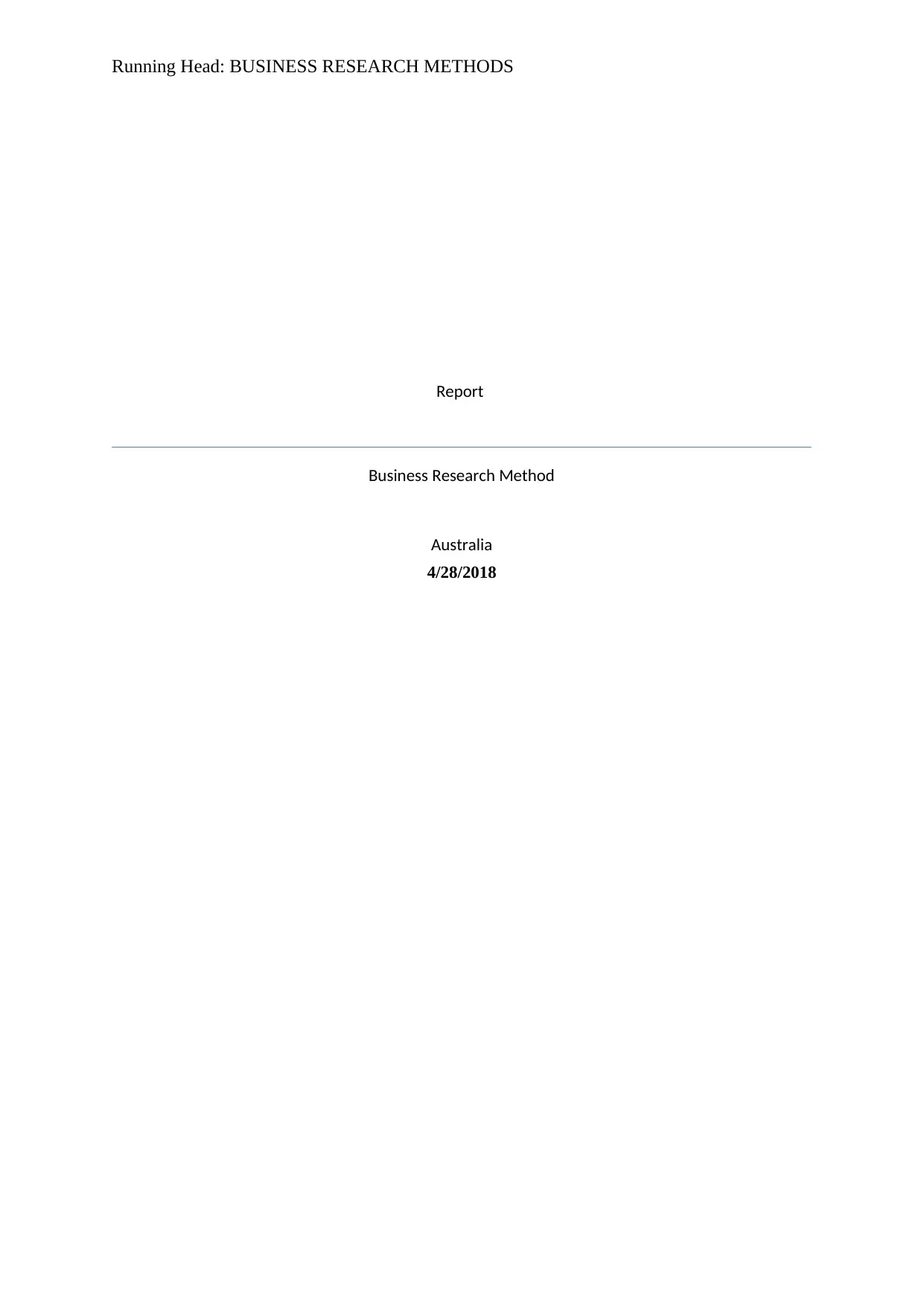
Running Head: BUSINESS RESEARCH METHODS
Report
Business Research Method
Australia
4/28/2018
Report
Business Research Method
Australia
4/28/2018
Paraphrase This Document
Need a fresh take? Get an instant paraphrase of this document with our AI Paraphraser
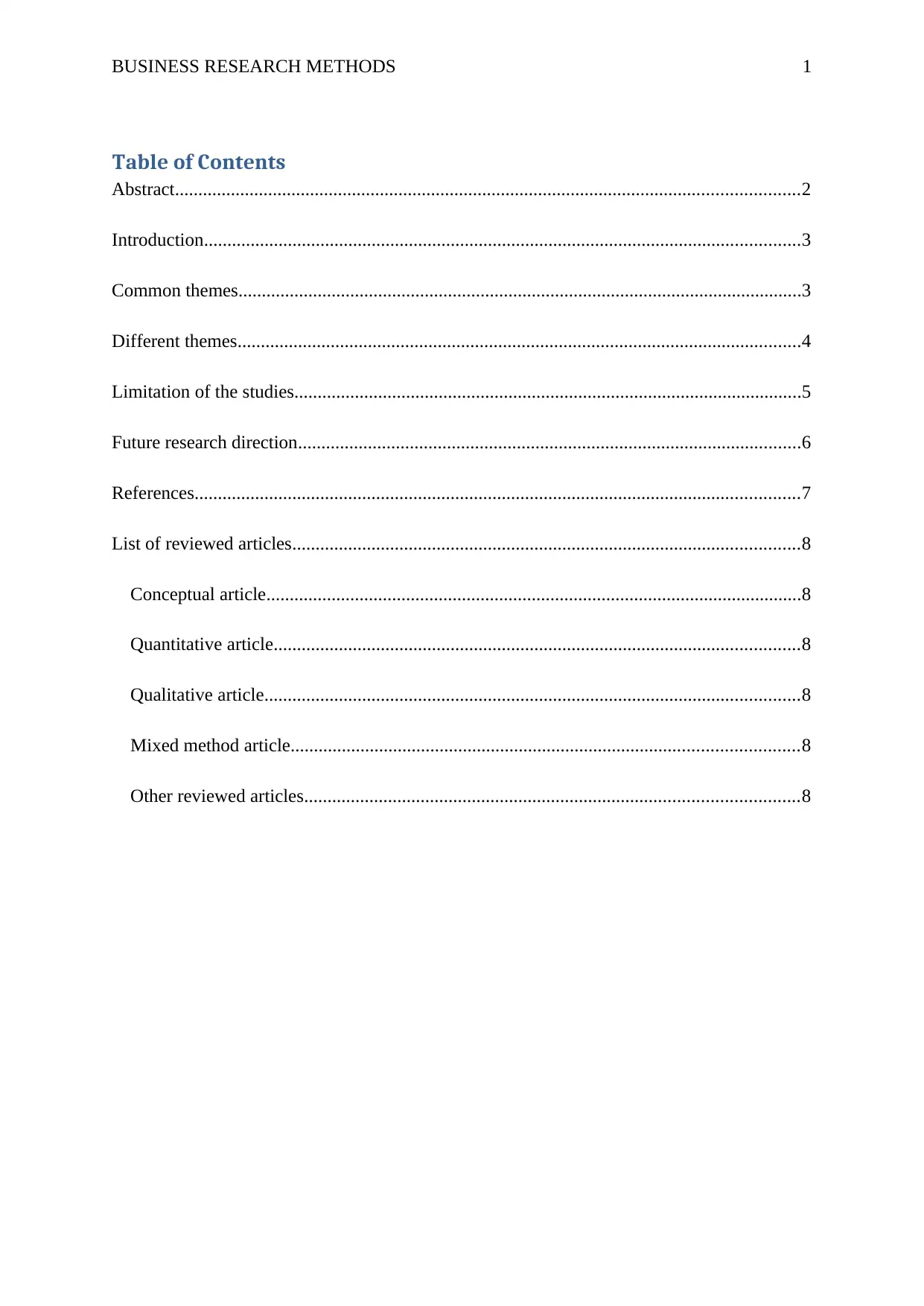
BUSINESS RESEARCH METHODS 1
Table of Contents
Abstract......................................................................................................................................2
Introduction................................................................................................................................3
Common themes.........................................................................................................................3
Different themes.........................................................................................................................4
Limitation of the studies.............................................................................................................5
Future research direction............................................................................................................6
References..................................................................................................................................7
List of reviewed articles.............................................................................................................8
Conceptual article...................................................................................................................8
Quantitative article.................................................................................................................8
Qualitative article...................................................................................................................8
Mixed method article.............................................................................................................8
Other reviewed articles..........................................................................................................8
Table of Contents
Abstract......................................................................................................................................2
Introduction................................................................................................................................3
Common themes.........................................................................................................................3
Different themes.........................................................................................................................4
Limitation of the studies.............................................................................................................5
Future research direction............................................................................................................6
References..................................................................................................................................7
List of reviewed articles.............................................................................................................8
Conceptual article...................................................................................................................8
Quantitative article.................................................................................................................8
Qualitative article...................................................................................................................8
Mixed method article.............................................................................................................8
Other reviewed articles..........................................................................................................8
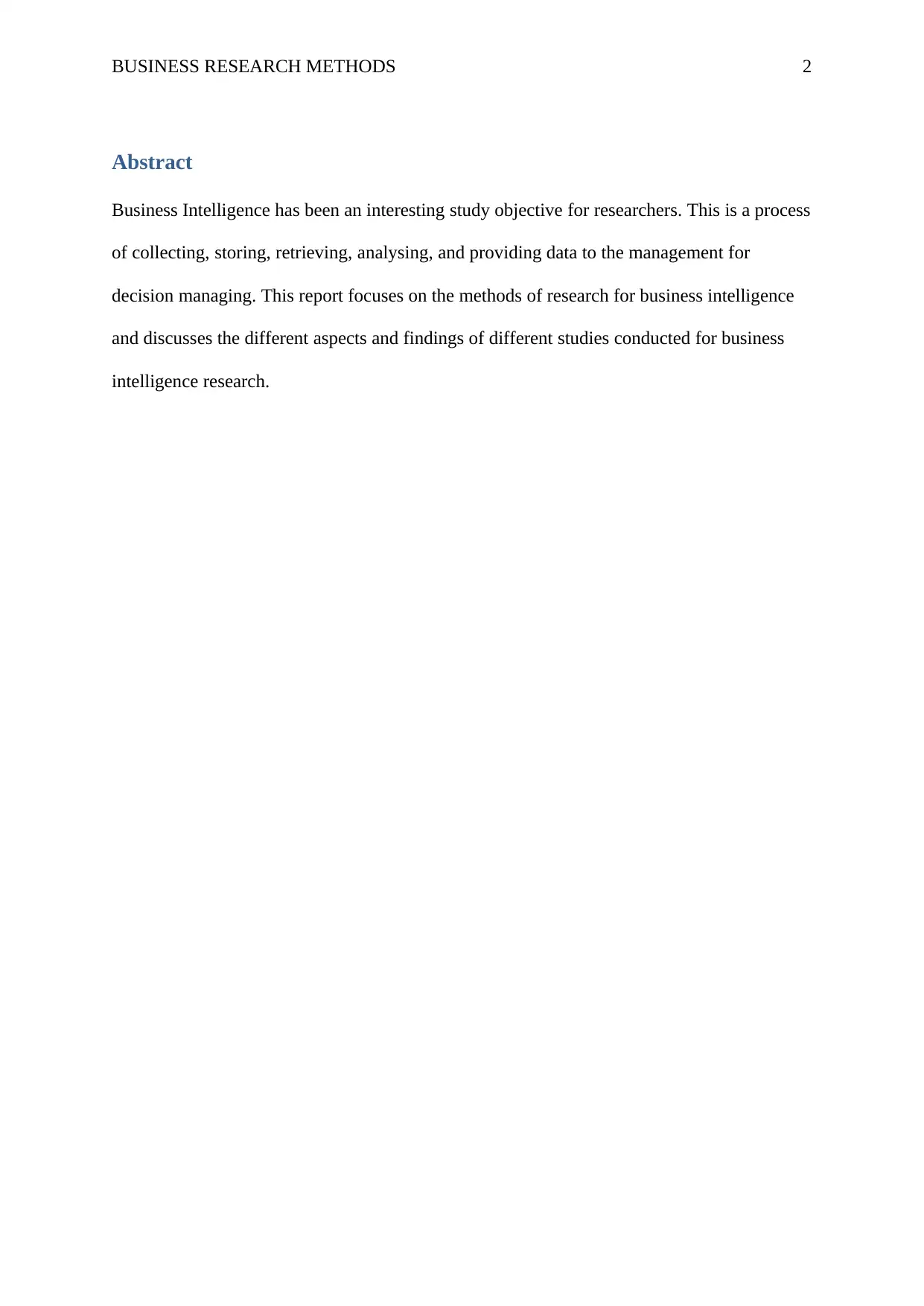
BUSINESS RESEARCH METHODS 2
Abstract
Business Intelligence has been an interesting study objective for researchers. This is a process
of collecting, storing, retrieving, analysing, and providing data to the management for
decision managing. This report focuses on the methods of research for business intelligence
and discusses the different aspects and findings of different studies conducted for business
intelligence research.
Abstract
Business Intelligence has been an interesting study objective for researchers. This is a process
of collecting, storing, retrieving, analysing, and providing data to the management for
decision managing. This report focuses on the methods of research for business intelligence
and discusses the different aspects and findings of different studies conducted for business
intelligence research.
⊘ This is a preview!⊘
Do you want full access?
Subscribe today to unlock all pages.

Trusted by 1+ million students worldwide
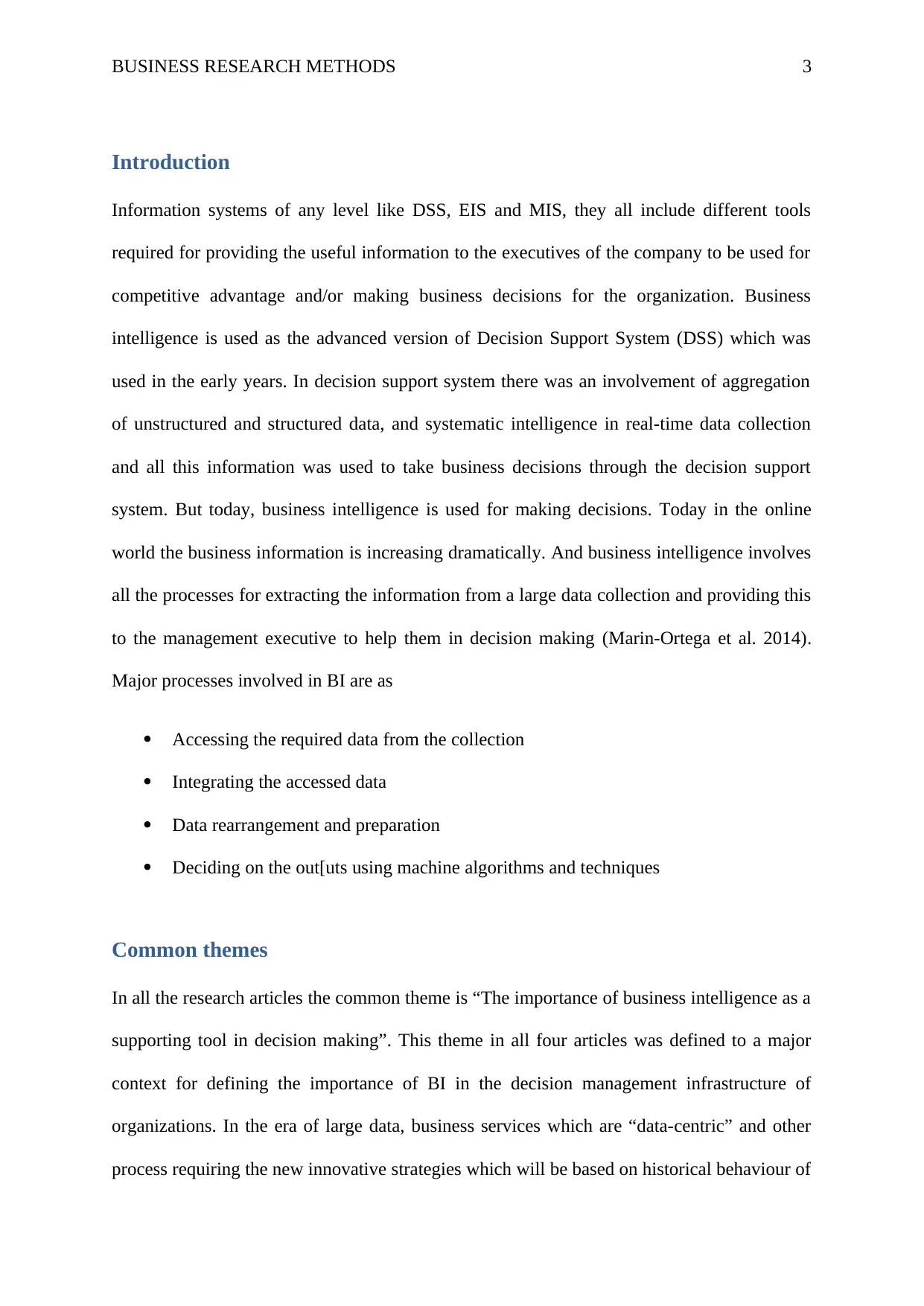
BUSINESS RESEARCH METHODS 3
Introduction
Information systems of any level like DSS, EIS and MIS, they all include different tools
required for providing the useful information to the executives of the company to be used for
competitive advantage and/or making business decisions for the organization. Business
intelligence is used as the advanced version of Decision Support System (DSS) which was
used in the early years. In decision support system there was an involvement of aggregation
of unstructured and structured data, and systematic intelligence in real-time data collection
and all this information was used to take business decisions through the decision support
system. But today, business intelligence is used for making decisions. Today in the online
world the business information is increasing dramatically. And business intelligence involves
all the processes for extracting the information from a large data collection and providing this
to the management executive to help them in decision making (Marin-Ortega et al. 2014).
Major processes involved in BI are as
Accessing the required data from the collection
Integrating the accessed data
Data rearrangement and preparation
Deciding on the out[uts using machine algorithms and techniques
Common themes
In all the research articles the common theme is “The importance of business intelligence as a
supporting tool in decision making”. This theme in all four articles was defined to a major
context for defining the importance of BI in the decision management infrastructure of
organizations. In the era of large data, business services which are “data-centric” and other
process requiring the new innovative strategies which will be based on historical behaviour of
Introduction
Information systems of any level like DSS, EIS and MIS, they all include different tools
required for providing the useful information to the executives of the company to be used for
competitive advantage and/or making business decisions for the organization. Business
intelligence is used as the advanced version of Decision Support System (DSS) which was
used in the early years. In decision support system there was an involvement of aggregation
of unstructured and structured data, and systematic intelligence in real-time data collection
and all this information was used to take business decisions through the decision support
system. But today, business intelligence is used for making decisions. Today in the online
world the business information is increasing dramatically. And business intelligence involves
all the processes for extracting the information from a large data collection and providing this
to the management executive to help them in decision making (Marin-Ortega et al. 2014).
Major processes involved in BI are as
Accessing the required data from the collection
Integrating the accessed data
Data rearrangement and preparation
Deciding on the out[uts using machine algorithms and techniques
Common themes
In all the research articles the common theme is “The importance of business intelligence as a
supporting tool in decision making”. This theme in all four articles was defined to a major
context for defining the importance of BI in the decision management infrastructure of
organizations. In the era of large data, business services which are “data-centric” and other
process requiring the new innovative strategies which will be based on historical behaviour of
Paraphrase This Document
Need a fresh take? Get an instant paraphrase of this document with our AI Paraphraser
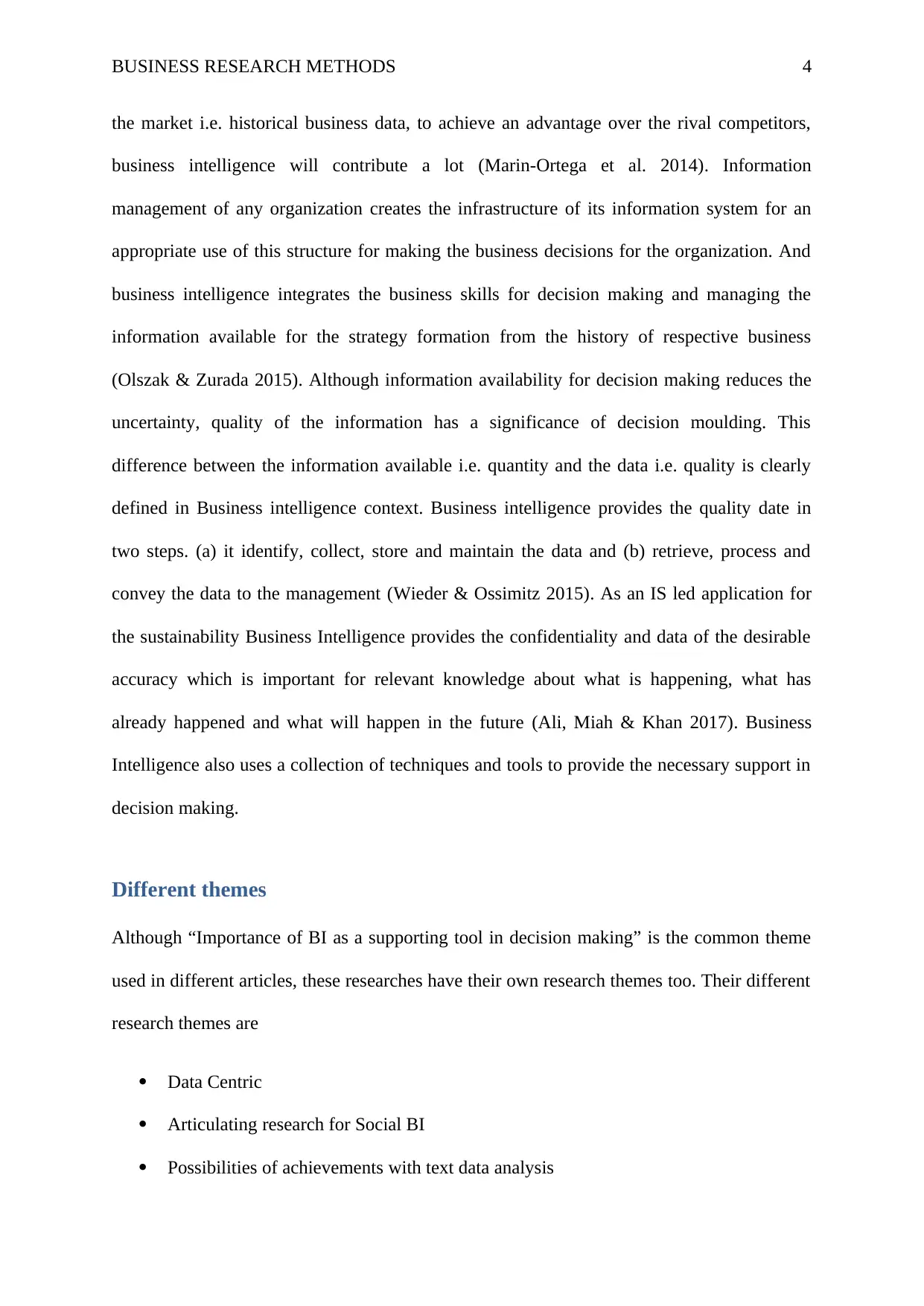
BUSINESS RESEARCH METHODS 4
the market i.e. historical business data, to achieve an advantage over the rival competitors,
business intelligence will contribute a lot (Marin-Ortega et al. 2014). Information
management of any organization creates the infrastructure of its information system for an
appropriate use of this structure for making the business decisions for the organization. And
business intelligence integrates the business skills for decision making and managing the
information available for the strategy formation from the history of respective business
(Olszak & Zurada 2015). Although information availability for decision making reduces the
uncertainty, quality of the information has a significance of decision moulding. This
difference between the information available i.e. quantity and the data i.e. quality is clearly
defined in Business intelligence context. Business intelligence provides the quality date in
two steps. (a) it identify, collect, store and maintain the data and (b) retrieve, process and
convey the data to the management (Wieder & Ossimitz 2015). As an IS led application for
the sustainability Business Intelligence provides the confidentiality and data of the desirable
accuracy which is important for relevant knowledge about what is happening, what has
already happened and what will happen in the future (Ali, Miah & Khan 2017). Business
Intelligence also uses a collection of techniques and tools to provide the necessary support in
decision making.
Different themes
Although “Importance of BI as a supporting tool in decision making” is the common theme
used in different articles, these researches have their own research themes too. Their different
research themes are
Data Centric
Articulating research for Social BI
Possibilities of achievements with text data analysis
the market i.e. historical business data, to achieve an advantage over the rival competitors,
business intelligence will contribute a lot (Marin-Ortega et al. 2014). Information
management of any organization creates the infrastructure of its information system for an
appropriate use of this structure for making the business decisions for the organization. And
business intelligence integrates the business skills for decision making and managing the
information available for the strategy formation from the history of respective business
(Olszak & Zurada 2015). Although information availability for decision making reduces the
uncertainty, quality of the information has a significance of decision moulding. This
difference between the information available i.e. quantity and the data i.e. quality is clearly
defined in Business intelligence context. Business intelligence provides the quality date in
two steps. (a) it identify, collect, store and maintain the data and (b) retrieve, process and
convey the data to the management (Wieder & Ossimitz 2015). As an IS led application for
the sustainability Business Intelligence provides the confidentiality and data of the desirable
accuracy which is important for relevant knowledge about what is happening, what has
already happened and what will happen in the future (Ali, Miah & Khan 2017). Business
Intelligence also uses a collection of techniques and tools to provide the necessary support in
decision making.
Different themes
Although “Importance of BI as a supporting tool in decision making” is the common theme
used in different articles, these researches have their own research themes too. Their different
research themes are
Data Centric
Articulating research for Social BI
Possibilities of achievements with text data analysis
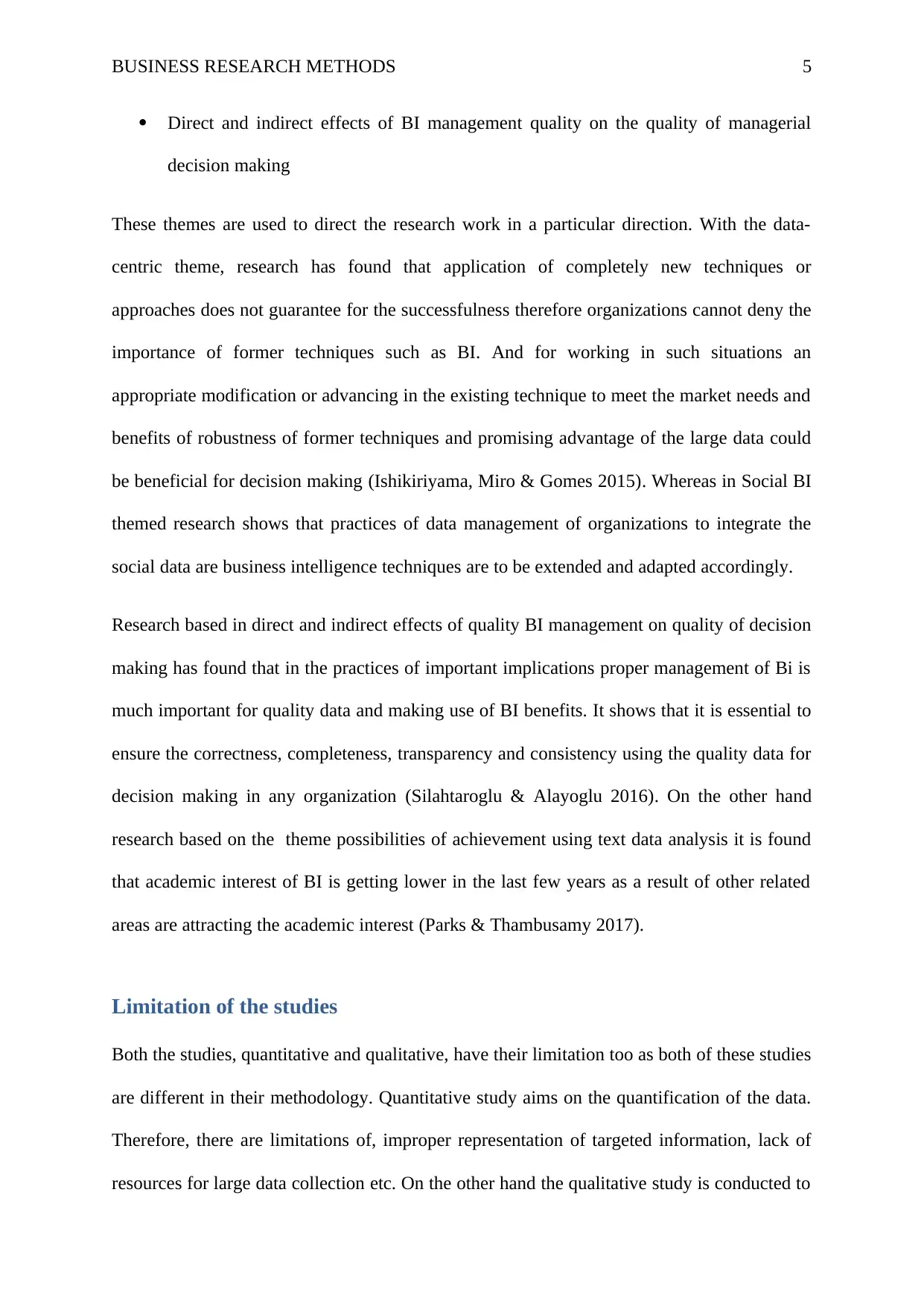
BUSINESS RESEARCH METHODS 5
Direct and indirect effects of BI management quality on the quality of managerial
decision making
These themes are used to direct the research work in a particular direction. With the data-
centric theme, research has found that application of completely new techniques or
approaches does not guarantee for the successfulness therefore organizations cannot deny the
importance of former techniques such as BI. And for working in such situations an
appropriate modification or advancing in the existing technique to meet the market needs and
benefits of robustness of former techniques and promising advantage of the large data could
be beneficial for decision making (Ishikiriyama, Miro & Gomes 2015). Whereas in Social BI
themed research shows that practices of data management of organizations to integrate the
social data are business intelligence techniques are to be extended and adapted accordingly.
Research based in direct and indirect effects of quality BI management on quality of decision
making has found that in the practices of important implications proper management of Bi is
much important for quality data and making use of BI benefits. It shows that it is essential to
ensure the correctness, completeness, transparency and consistency using the quality data for
decision making in any organization (Silahtaroglu & Alayoglu 2016). On the other hand
research based on the theme possibilities of achievement using text data analysis it is found
that academic interest of BI is getting lower in the last few years as a result of other related
areas are attracting the academic interest (Parks & Thambusamy 2017).
Limitation of the studies
Both the studies, quantitative and qualitative, have their limitation too as both of these studies
are different in their methodology. Quantitative study aims on the quantification of the data.
Therefore, there are limitations of, improper representation of targeted information, lack of
resources for large data collection etc. On the other hand the qualitative study is conducted to
Direct and indirect effects of BI management quality on the quality of managerial
decision making
These themes are used to direct the research work in a particular direction. With the data-
centric theme, research has found that application of completely new techniques or
approaches does not guarantee for the successfulness therefore organizations cannot deny the
importance of former techniques such as BI. And for working in such situations an
appropriate modification or advancing in the existing technique to meet the market needs and
benefits of robustness of former techniques and promising advantage of the large data could
be beneficial for decision making (Ishikiriyama, Miro & Gomes 2015). Whereas in Social BI
themed research shows that practices of data management of organizations to integrate the
social data are business intelligence techniques are to be extended and adapted accordingly.
Research based in direct and indirect effects of quality BI management on quality of decision
making has found that in the practices of important implications proper management of Bi is
much important for quality data and making use of BI benefits. It shows that it is essential to
ensure the correctness, completeness, transparency and consistency using the quality data for
decision making in any organization (Silahtaroglu & Alayoglu 2016). On the other hand
research based on the theme possibilities of achievement using text data analysis it is found
that academic interest of BI is getting lower in the last few years as a result of other related
areas are attracting the academic interest (Parks & Thambusamy 2017).
Limitation of the studies
Both the studies, quantitative and qualitative, have their limitation too as both of these studies
are different in their methodology. Quantitative study aims on the quantification of the data.
Therefore, there are limitations of, improper representation of targeted information, lack of
resources for large data collection etc. On the other hand the qualitative study is conducted to
⊘ This is a preview!⊘
Do you want full access?
Subscribe today to unlock all pages.

Trusted by 1+ million students worldwide
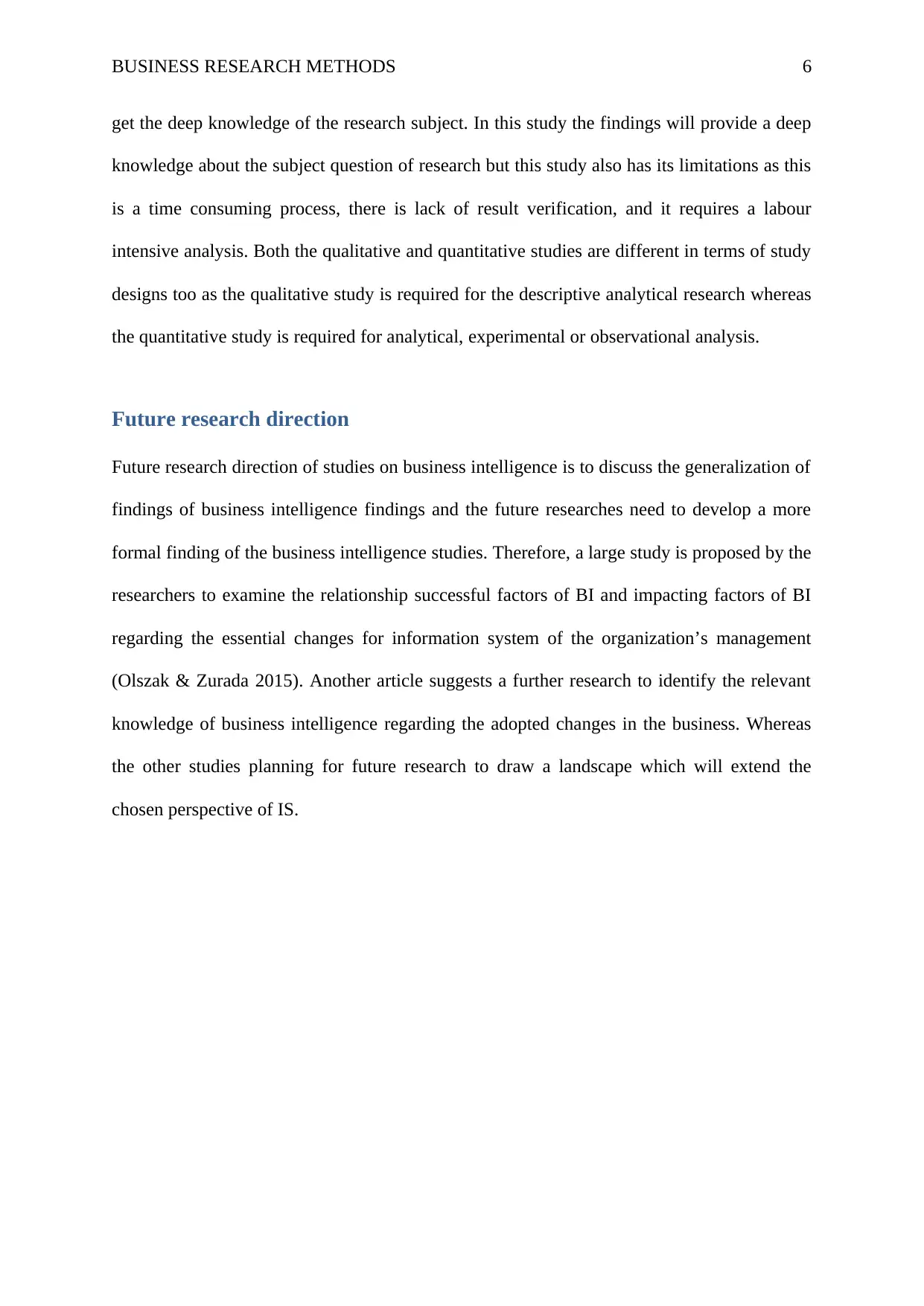
BUSINESS RESEARCH METHODS 6
get the deep knowledge of the research subject. In this study the findings will provide a deep
knowledge about the subject question of research but this study also has its limitations as this
is a time consuming process, there is lack of result verification, and it requires a labour
intensive analysis. Both the qualitative and quantitative studies are different in terms of study
designs too as the qualitative study is required for the descriptive analytical research whereas
the quantitative study is required for analytical, experimental or observational analysis.
Future research direction
Future research direction of studies on business intelligence is to discuss the generalization of
findings of business intelligence findings and the future researches need to develop a more
formal finding of the business intelligence studies. Therefore, a large study is proposed by the
researchers to examine the relationship successful factors of BI and impacting factors of BI
regarding the essential changes for information system of the organization’s management
(Olszak & Zurada 2015). Another article suggests a further research to identify the relevant
knowledge of business intelligence regarding the adopted changes in the business. Whereas
the other studies planning for future research to draw a landscape which will extend the
chosen perspective of IS.
get the deep knowledge of the research subject. In this study the findings will provide a deep
knowledge about the subject question of research but this study also has its limitations as this
is a time consuming process, there is lack of result verification, and it requires a labour
intensive analysis. Both the qualitative and quantitative studies are different in terms of study
designs too as the qualitative study is required for the descriptive analytical research whereas
the quantitative study is required for analytical, experimental or observational analysis.
Future research direction
Future research direction of studies on business intelligence is to discuss the generalization of
findings of business intelligence findings and the future researches need to develop a more
formal finding of the business intelligence studies. Therefore, a large study is proposed by the
researchers to examine the relationship successful factors of BI and impacting factors of BI
regarding the essential changes for information system of the organization’s management
(Olszak & Zurada 2015). Another article suggests a further research to identify the relevant
knowledge of business intelligence regarding the adopted changes in the business. Whereas
the other studies planning for future research to draw a landscape which will extend the
chosen perspective of IS.
Paraphrase This Document
Need a fresh take? Get an instant paraphrase of this document with our AI Paraphraser
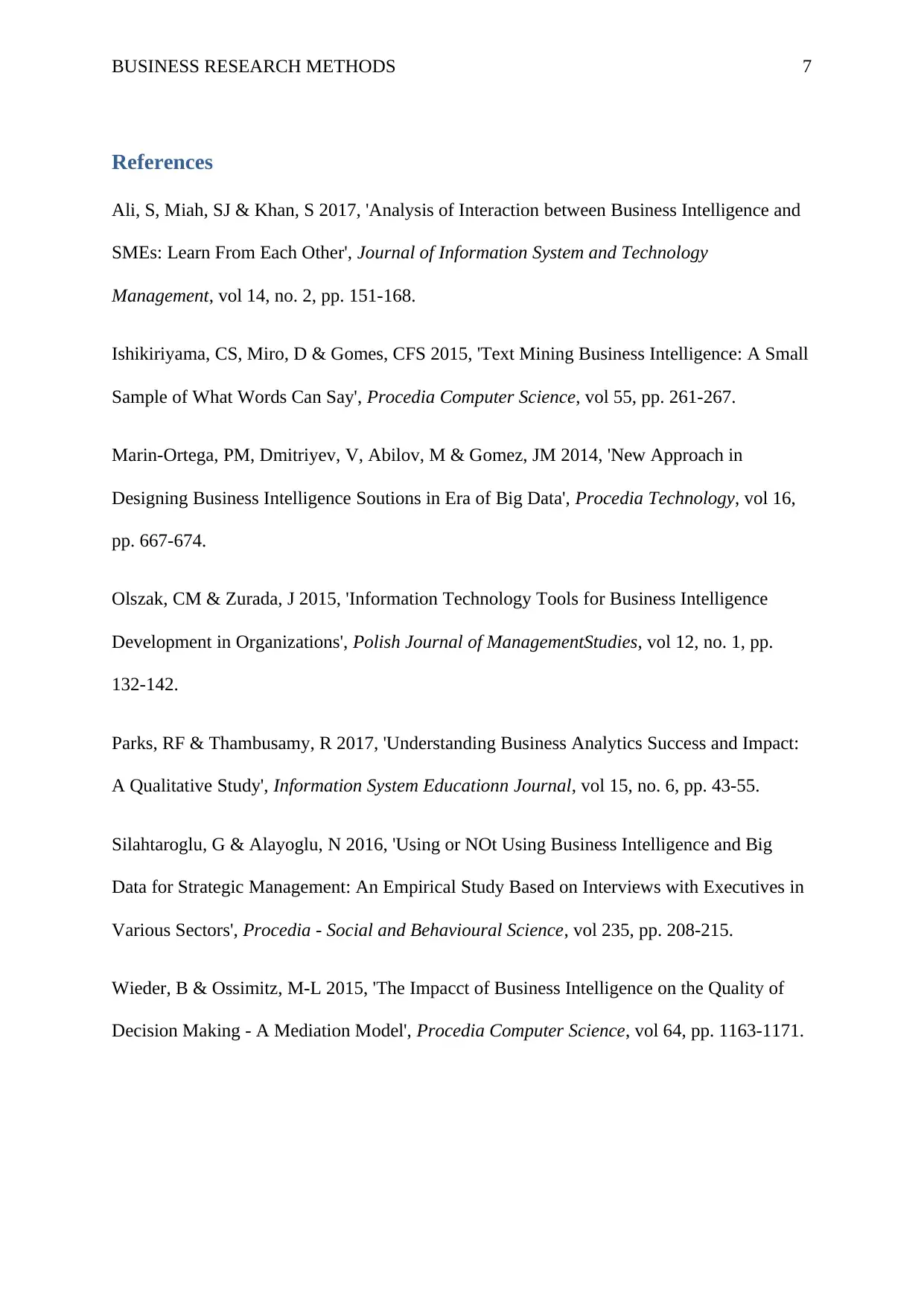
BUSINESS RESEARCH METHODS 7
References
Ali, S, Miah, SJ & Khan, S 2017, 'Analysis of Interaction between Business Intelligence and
SMEs: Learn From Each Other', Journal of Information System and Technology
Management, vol 14, no. 2, pp. 151-168.
Ishikiriyama, CS, Miro, D & Gomes, CFS 2015, 'Text Mining Business Intelligence: A Small
Sample of What Words Can Say', Procedia Computer Science, vol 55, pp. 261-267.
Marin-Ortega, PM, Dmitriyev, V, Abilov, M & Gomez, JM 2014, 'New Approach in
Designing Business Intelligence Soutions in Era of Big Data', Procedia Technology, vol 16,
pp. 667-674.
Olszak, CM & Zurada, J 2015, 'Information Technology Tools for Business Intelligence
Development in Organizations', Polish Journal of ManagementStudies, vol 12, no. 1, pp.
132-142.
Parks, RF & Thambusamy, R 2017, 'Understanding Business Analytics Success and Impact:
A Qualitative Study', Information System Educationn Journal, vol 15, no. 6, pp. 43-55.
Silahtaroglu, G & Alayoglu, N 2016, 'Using or NOt Using Business Intelligence and Big
Data for Strategic Management: An Empirical Study Based on Interviews with Executives in
Various Sectors', Procedia - Social and Behavioural Science, vol 235, pp. 208-215.
Wieder, B & Ossimitz, M-L 2015, 'The Impacct of Business Intelligence on the Quality of
Decision Making - A Mediation Model', Procedia Computer Science, vol 64, pp. 1163-1171.
References
Ali, S, Miah, SJ & Khan, S 2017, 'Analysis of Interaction between Business Intelligence and
SMEs: Learn From Each Other', Journal of Information System and Technology
Management, vol 14, no. 2, pp. 151-168.
Ishikiriyama, CS, Miro, D & Gomes, CFS 2015, 'Text Mining Business Intelligence: A Small
Sample of What Words Can Say', Procedia Computer Science, vol 55, pp. 261-267.
Marin-Ortega, PM, Dmitriyev, V, Abilov, M & Gomez, JM 2014, 'New Approach in
Designing Business Intelligence Soutions in Era of Big Data', Procedia Technology, vol 16,
pp. 667-674.
Olszak, CM & Zurada, J 2015, 'Information Technology Tools for Business Intelligence
Development in Organizations', Polish Journal of ManagementStudies, vol 12, no. 1, pp.
132-142.
Parks, RF & Thambusamy, R 2017, 'Understanding Business Analytics Success and Impact:
A Qualitative Study', Information System Educationn Journal, vol 15, no. 6, pp. 43-55.
Silahtaroglu, G & Alayoglu, N 2016, 'Using or NOt Using Business Intelligence and Big
Data for Strategic Management: An Empirical Study Based on Interviews with Executives in
Various Sectors', Procedia - Social and Behavioural Science, vol 235, pp. 208-215.
Wieder, B & Ossimitz, M-L 2015, 'The Impacct of Business Intelligence on the Quality of
Decision Making - A Mediation Model', Procedia Computer Science, vol 64, pp. 1163-1171.
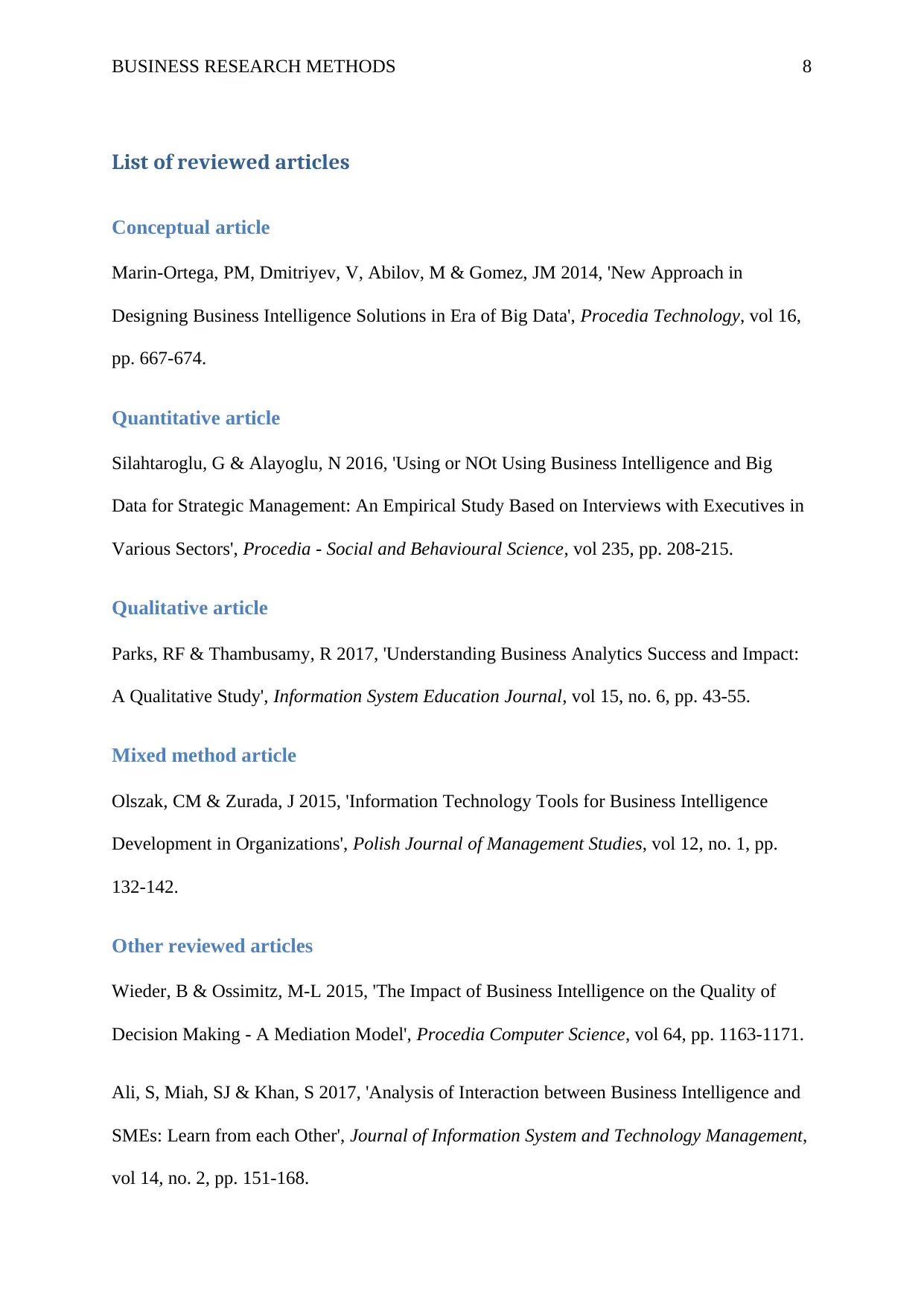
BUSINESS RESEARCH METHODS 8
List of reviewed articles
Conceptual article
Marin-Ortega, PM, Dmitriyev, V, Abilov, M & Gomez, JM 2014, 'New Approach in
Designing Business Intelligence Solutions in Era of Big Data', Procedia Technology, vol 16,
pp. 667-674.
Quantitative article
Silahtaroglu, G & Alayoglu, N 2016, 'Using or NOt Using Business Intelligence and Big
Data for Strategic Management: An Empirical Study Based on Interviews with Executives in
Various Sectors', Procedia - Social and Behavioural Science, vol 235, pp. 208-215.
Qualitative article
Parks, RF & Thambusamy, R 2017, 'Understanding Business Analytics Success and Impact:
A Qualitative Study', Information System Education Journal, vol 15, no. 6, pp. 43-55.
Mixed method article
Olszak, CM & Zurada, J 2015, 'Information Technology Tools for Business Intelligence
Development in Organizations', Polish Journal of Management Studies, vol 12, no. 1, pp.
132-142.
Other reviewed articles
Wieder, B & Ossimitz, M-L 2015, 'The Impact of Business Intelligence on the Quality of
Decision Making - A Mediation Model', Procedia Computer Science, vol 64, pp. 1163-1171.
Ali, S, Miah, SJ & Khan, S 2017, 'Analysis of Interaction between Business Intelligence and
SMEs: Learn from each Other', Journal of Information System and Technology Management,
vol 14, no. 2, pp. 151-168.
List of reviewed articles
Conceptual article
Marin-Ortega, PM, Dmitriyev, V, Abilov, M & Gomez, JM 2014, 'New Approach in
Designing Business Intelligence Solutions in Era of Big Data', Procedia Technology, vol 16,
pp. 667-674.
Quantitative article
Silahtaroglu, G & Alayoglu, N 2016, 'Using or NOt Using Business Intelligence and Big
Data for Strategic Management: An Empirical Study Based on Interviews with Executives in
Various Sectors', Procedia - Social and Behavioural Science, vol 235, pp. 208-215.
Qualitative article
Parks, RF & Thambusamy, R 2017, 'Understanding Business Analytics Success and Impact:
A Qualitative Study', Information System Education Journal, vol 15, no. 6, pp. 43-55.
Mixed method article
Olszak, CM & Zurada, J 2015, 'Information Technology Tools for Business Intelligence
Development in Organizations', Polish Journal of Management Studies, vol 12, no. 1, pp.
132-142.
Other reviewed articles
Wieder, B & Ossimitz, M-L 2015, 'The Impact of Business Intelligence on the Quality of
Decision Making - A Mediation Model', Procedia Computer Science, vol 64, pp. 1163-1171.
Ali, S, Miah, SJ & Khan, S 2017, 'Analysis of Interaction between Business Intelligence and
SMEs: Learn from each Other', Journal of Information System and Technology Management,
vol 14, no. 2, pp. 151-168.
⊘ This is a preview!⊘
Do you want full access?
Subscribe today to unlock all pages.

Trusted by 1+ million students worldwide
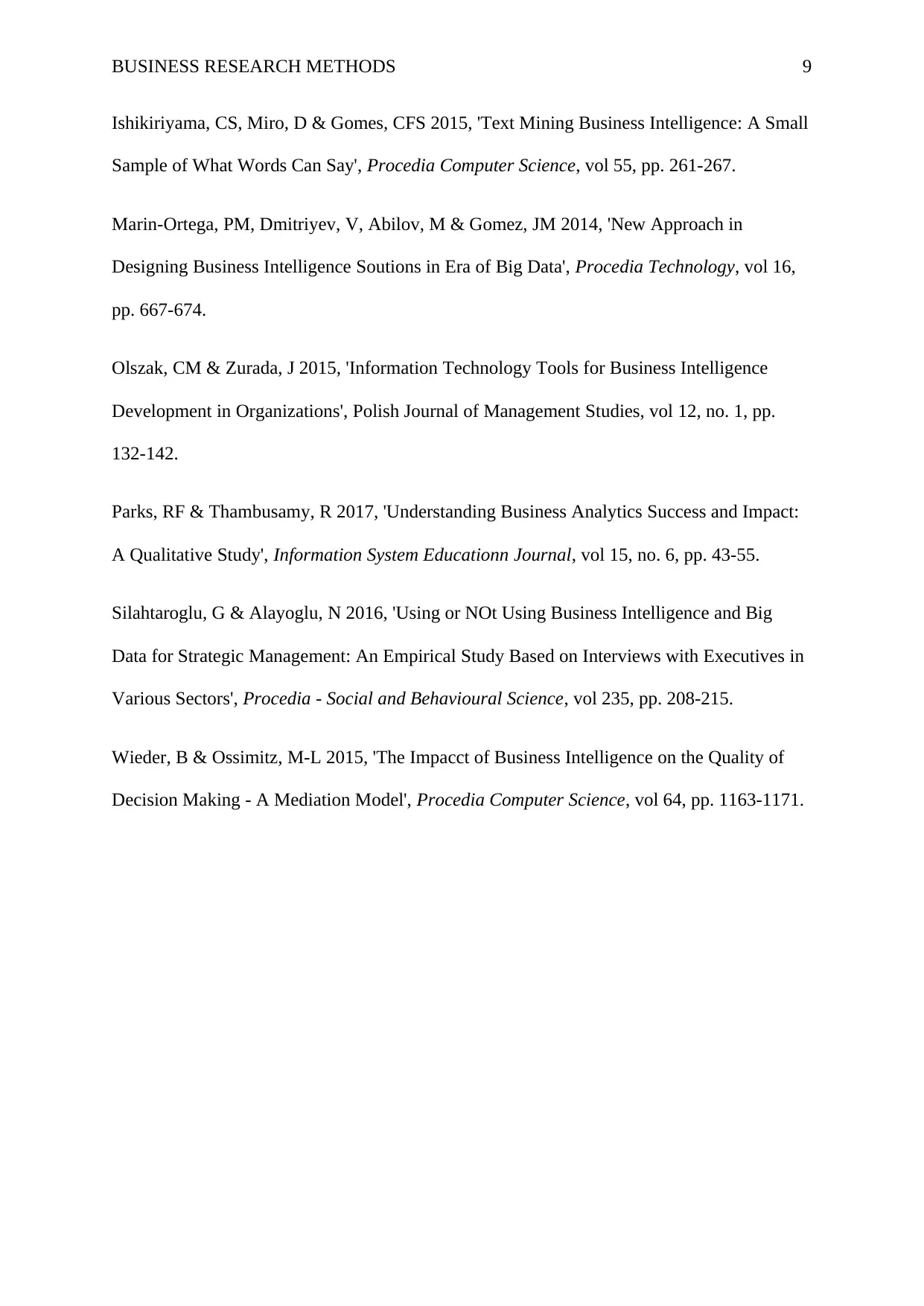
BUSINESS RESEARCH METHODS 9
Ishikiriyama, CS, Miro, D & Gomes, CFS 2015, 'Text Mining Business Intelligence: A Small
Sample of What Words Can Say', Procedia Computer Science, vol 55, pp. 261-267.
Marin-Ortega, PM, Dmitriyev, V, Abilov, M & Gomez, JM 2014, 'New Approach in
Designing Business Intelligence Soutions in Era of Big Data', Procedia Technology, vol 16,
pp. 667-674.
Olszak, CM & Zurada, J 2015, 'Information Technology Tools for Business Intelligence
Development in Organizations', Polish Journal of Management Studies, vol 12, no. 1, pp.
132-142.
Parks, RF & Thambusamy, R 2017, 'Understanding Business Analytics Success and Impact:
A Qualitative Study', Information System Educationn Journal, vol 15, no. 6, pp. 43-55.
Silahtaroglu, G & Alayoglu, N 2016, 'Using or NOt Using Business Intelligence and Big
Data for Strategic Management: An Empirical Study Based on Interviews with Executives in
Various Sectors', Procedia - Social and Behavioural Science, vol 235, pp. 208-215.
Wieder, B & Ossimitz, M-L 2015, 'The Impacct of Business Intelligence on the Quality of
Decision Making - A Mediation Model', Procedia Computer Science, vol 64, pp. 1163-1171.
Ishikiriyama, CS, Miro, D & Gomes, CFS 2015, 'Text Mining Business Intelligence: A Small
Sample of What Words Can Say', Procedia Computer Science, vol 55, pp. 261-267.
Marin-Ortega, PM, Dmitriyev, V, Abilov, M & Gomez, JM 2014, 'New Approach in
Designing Business Intelligence Soutions in Era of Big Data', Procedia Technology, vol 16,
pp. 667-674.
Olszak, CM & Zurada, J 2015, 'Information Technology Tools for Business Intelligence
Development in Organizations', Polish Journal of Management Studies, vol 12, no. 1, pp.
132-142.
Parks, RF & Thambusamy, R 2017, 'Understanding Business Analytics Success and Impact:
A Qualitative Study', Information System Educationn Journal, vol 15, no. 6, pp. 43-55.
Silahtaroglu, G & Alayoglu, N 2016, 'Using or NOt Using Business Intelligence and Big
Data for Strategic Management: An Empirical Study Based on Interviews with Executives in
Various Sectors', Procedia - Social and Behavioural Science, vol 235, pp. 208-215.
Wieder, B & Ossimitz, M-L 2015, 'The Impacct of Business Intelligence on the Quality of
Decision Making - A Mediation Model', Procedia Computer Science, vol 64, pp. 1163-1171.
1 out of 10
Related Documents
Your All-in-One AI-Powered Toolkit for Academic Success.
+13062052269
info@desklib.com
Available 24*7 on WhatsApp / Email
![[object Object]](/_next/static/media/star-bottom.7253800d.svg)
Unlock your academic potential
Copyright © 2020–2026 A2Z Services. All Rights Reserved. Developed and managed by ZUCOL.





